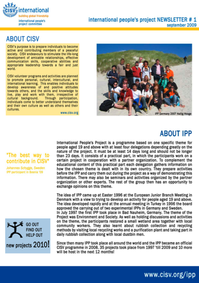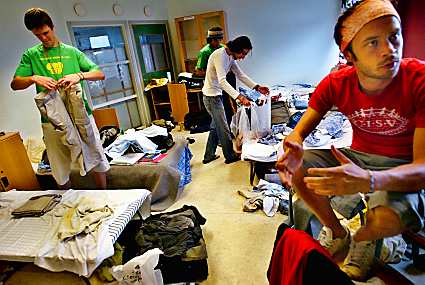The revived IPP-newsletter from a marketing perspective.
Many international committees publish newsletters. Check out PEANUTS by the Seminar Camp committee. The Mosaic committee even publishes a real paper magazine. These newsletters usually contain stories and experiences from participants that serve as inspiration, or inform about the latest development regarding content or administration of that paticular programme.
When I was chair of the IPP taskforce, we also published a newsletter. Next to the usual announcements, the killer app of the newsletter was that it contained the synopsis of every IPP coming up the following year. People could sign up for the newsletter e-mail list and receive a complete list of upcoming IPPs as early as late August. When I usually showed up at the annual board meeting in Germany in November to hand out IPP infos to the chapters, I met a whole bunch of people who already knew which IPP they wanted to apply for.
 From the international IPP taskforce perspective the newsletter was an ideal direct marketing tool, cutting out any national or chapter IPP co-ordinators along the way. Not that they were all doing a bad job, but especially in the case of IPP, where adults apply for specific themes or projects (as opposed to let's say the general "village" experience), it is a great opportunity to use this kind of direct push-information. (More like "pull-information", the IPP-website was the alternative direct-marketing tool, but people needed to be actively searching for new IPPs to get there). Instead of relying on two ore three middle men to deliver the information to the target audience, we just pushed the "send e-Mail" button.
From the international IPP taskforce perspective the newsletter was an ideal direct marketing tool, cutting out any national or chapter IPP co-ordinators along the way. Not that they were all doing a bad job, but especially in the case of IPP, where adults apply for specific themes or projects (as opposed to let's say the general "village" experience), it is a great opportunity to use this kind of direct push-information. (More like "pull-information", the IPP-website was the alternative direct-marketing tool, but people needed to be actively searching for new IPPs to get there). Instead of relying on two ore three middle men to deliver the information to the target audience, we just pushed the "send e-Mail" button.
So, I'm glad that after a hiatus of a few years, the IPP committee brought the newsletter back (curiously called #1) - and a good-looking one, too. There's just one downer: Why is there no place to sign up for an e-mail list? The newsletter is out since September, and I only found out today. Where can I subscribe?
Many international committees publish newsletters. Check out PEANUTS by the Seminar Camp committee. The Mosaic committee even publishes a real paper magazine. These newsletters usually contain stories and experiences from participants that serve as inspiration, or inform about the latest development regarding content or administration of that paticular programme.
When I was chair of the IPP taskforce, we also published a newsletter. Next to the usual announcements, the killer app of the newsletter was that it contained the synopsis of every IPP coming up the following year. People could sign up for the newsletter e-mail list and receive a complete list of upcoming IPPs as early as late August. When I usually showed up at the annual board meeting in Germany in November to hand out IPP infos to the chapters, I met a whole bunch of people who already knew which IPP they wanted to apply for.
 From the international IPP taskforce perspective the newsletter was an ideal direct marketing tool, cutting out any national or chapter IPP co-ordinators along the way. Not that they were all doing a bad job, but especially in the case of IPP, where adults apply for specific themes or projects (as opposed to let's say the general "village" experience), it is a great opportunity to use this kind of direct push-information. (More like "pull-information", the IPP-website was the alternative direct-marketing tool, but people needed to be actively searching for new IPPs to get there). Instead of relying on two ore three middle men to deliver the information to the target audience, we just pushed the "send e-Mail" button.
From the international IPP taskforce perspective the newsletter was an ideal direct marketing tool, cutting out any national or chapter IPP co-ordinators along the way. Not that they were all doing a bad job, but especially in the case of IPP, where adults apply for specific themes or projects (as opposed to let's say the general "village" experience), it is a great opportunity to use this kind of direct push-information. (More like "pull-information", the IPP-website was the alternative direct-marketing tool, but people needed to be actively searching for new IPPs to get there). Instead of relying on two ore three middle men to deliver the information to the target audience, we just pushed the "send e-Mail" button.So, I'm glad that after a hiatus of a few years, the IPP committee brought the newsletter back (curiously called #1) - and a good-looking one, too. There's just one downer: Why is there no place to sign up for an e-mail list? The newsletter is out since September, and I only found out today. Where can I subscribe?

